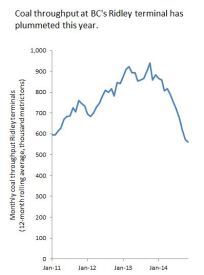Coal exports from the Ridley terminal on the north British Columbia coast are continuing their free-fall. In November, the terminal reported some of the lowest coal export volumes since the depths of the global recession in 2009.
It’s not just a one-month blip: exports at the terminal have been falling in fits and starts since late last year. Ridley’s shipments of “thermal” coal—the grade of coal burned in overseas power plants—have been weak since June, and have been stuck at zero for two consecutive months. That’s not too surprising, given that most of the mines that shipped thermal coal to Ridley have now been shut down.
For metallurgical of “met” coal, which is used to make iron and steel, Ridley shipped 263,652 metric tons in November: down 36% compared to the previous November, less than half of the 2013 average, and one of the weakest months for met coal throughput since early 2010.
As Brent Jang from the Globe and Mail recently reported, Ridley recently put a planned expansion on hold:
In early 2011, Ridley had shipping capacity of almost 12 million tonnes annually before embarking on a $255-million, multiyear expansion in an effort to reach 25 million tonnes a year by the end of 2015. After the initial phases of construction, the terminal’s capacity rose to 15 million tonnes annually in 2013 and is targeted to be at 18 million tonnes annually by the end of 2014.
But the expansion will be suspended for up to five years once it hits 18 million tonnes of annual capacity, disrupting Canada’s hopes for a coal exporting bonanza from the Ridley site to Asia.
But from January through November of 2014, Ridley has shipped well under 7 million metric tons of coal and petroleum coke. In 2013, the terminal’s busiest year, throughput just barely topped 12 million metric tons. The substantial capacity expansion at Ridley will bring the terminal’s capacity to 18 million tons per year—leaving Ridley’s throughput for 2014 about 11 million tons short, with over 60 percent of its capacity unused.
It’s no wonder the Canadian government is having such a hard time finding a private buyer to take over the terminal.









